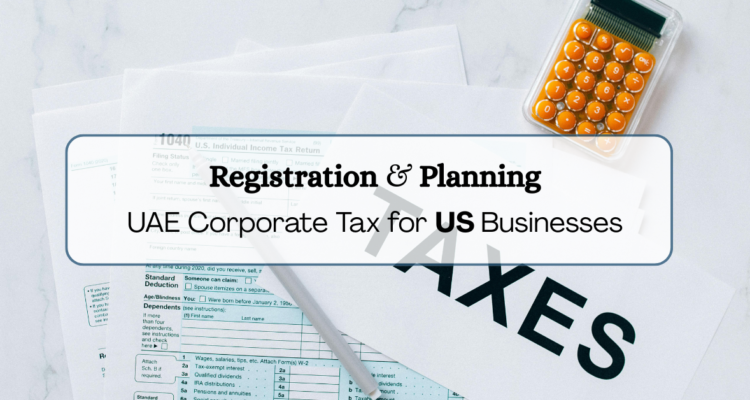The United Arab Emirates (UAE) is an attractive destination for UK entrepreneurs, offering a strategic…

Navigating Corporate Tax Registration and Planning for US Business Owners in the UAE
Expanding a US-based business to the United Arab Emirates (UAE) offers access to a thriving, tax-friendly market strategically positioned for global trade.
While the UAE’s business environment is attractive, understanding and complying with its corporate tax framework is critical for US business owners. Introduced in June 2023, the UAE’s corporate tax regime applies a 9% rate on taxable income, with exemptions for certain entities.
At Global Business Konsultancy, we specialize in guiding US businesses through corporate tax registration and strategic planning to ensure compliance and optimize financial outcomes.
Understanding UAE Corporate Tax for US Businesses
The UAE’s Federal Decree-Law No. 47 of 2022 introduced a corporate tax (CT) regime effective for financial years starting on or after June 1, 2023. Key features include:
- Tax Rate: 9% on taxable income exceeding AED 375,000 (approximately USD 102,000).
- Exemptions: Free zone businesses under specific conditions (Qualifying Free Zone Persons) may enjoy a 0% tax rate on qualifying income, such as income from trading with other free zone entities or exports.
- Scope: Applies to all businesses operating in the UAE, including mainland and free zone companies, but excludes natural resource extraction businesses (subject to emirate-level taxation).
- Taxable Income: Includes profits from business activities, adjusted for allowable deductions, exemptions, and losses carried forward.
For US business owners, understanding the interplay between UAE corporate tax and US tax obligations (e.g., IRS reporting under FATCA or FBAR) is essential to avoid double taxation and ensure compliance.
Step-by-Step Guide to Corporate Tax Registration in the UAE
Step 1: Determine Tax Applicability
Assess whether your US business’s UAE operations are subject to corporate tax:
- Mainland Companies: Subject to 9% CT on taxable income above AED 375,000.
- Free Zone Companies: May qualify for 0% CT on qualifying income if they meet criteria such as maintaining adequate substance (e.g., physical presence, employees) and not electing to be taxed at the standard rate.
- Offshore Companies: Generally not subject to CT unless they have a permanent establishment (PE) in the UAE.
Consult with experts like Global Business Konsultancy to evaluate your business structure and tax obligations, especially for hybrid setups involving both mainland and free zone operations.
Step 2: Register for Corporate Tax
All taxable entities must register with the Federal Tax Authority (FTA) within the prescribed timeline (typically within 6 months of the financial year-end or business commencement). Steps include:
- Access the FTA Portal: Visit the FTA’s EmaraTax platform (www.tax.gov.ae).
- Submit Required Documents:
- UAE business license.
- Certificate of Incorporation (US and UAE entities).
- Financial statements or projected income for the first year.
- Emirates ID and passport copies for key personnel.
- Obtain a Tax Registration Number (TRN): Issued upon successful registration, the TRN is used for all tax-related filings.
Step 3: Maintain Accurate Financial Records
UAE corporate tax law requires businesses to maintain audited financial records for at least 7 years. For US businesses:
- Adopt International Financial Reporting Standards (IFRS) for consistency.
- Track deductible expenses (e.g., operational costs, depreciation) and non-deductible expenses (e.g., fines, personal expenses).
- Document related-party transactions to comply with transfer pricing regulations.
Align UAE financial reporting with US GAAP requirements to streamline cross-border compliance.
Step 4: File Corporate Tax Returns
- Deadline: Tax returns must be filed within 9 months of the financial year-end (e.g., by March 31, 2025, for a June 30, 2024, year-end).
- Process: Submit returns via the EmaraTax portal, including taxable income calculations, deductions, and any tax credits.
- Payment: Settle any tax liability within the same 9-month period.
Use Global Business Konsultancy tax advisory services to ensure accurate filings and avoid penalties.
Step 5: Leverage Double Taxation Agreements (DTAs)
The UAE and the US have a bilateral agreement to prevent double taxation. Key benefits include:
- Tax credits for taxes paid in the UAE, reducing US tax liability.
- Relief from withholding taxes on dividends, interest, or royalties (subject to treaty conditions).
- Work with a tax consultant to claim DTA benefits and file IRS Form 8833 for treaty-based disclosures.
Strategic Tax Planning for US Business Owners
Effective tax planning can minimize liabilities and enhance profitability. Consider these strategies:
- Choose the Right Business Structure:
- Opt for a free zone setup to benefit from 0% CT on qualifying income, ideal for export-oriented or tech businesses.
- Evaluate mainland setups for businesses requiring local market access, factoring in the 9% CT rate.
- Optimize Free Zone Benefits:
- Ensure compliance with free zone substance requirements (e.g., local office, employees) to maintain 0% CT eligibility.
- Avoid activities that trigger taxable income, such as trading with mainland UAE entities (subject to 9% CT).
- Utilize Tax Incentives:
- Deduct allowable expenses, including startup costs, employee salaries, and R&D expenditures.
- Carry forward losses for up to 7 years to offset future taxable income.
- Plan for VAT Compliance:
- If your UAE revenue exceeds AED 375,000 annually, register for Value Added Tax (VAT) at 5%.
- Maintain separate records for VAT and CT to streamline compliance.
- Engage Professional Support:
- Partner with Global Business Konsultancy for end-to-end tax planning, including registration, filing, and compliance with UAE and US regulations.
- Our experts ensure your business leverages all available exemptions and incentives.
Common Challenges and Solutions
- Challenge: Navigating dual tax jurisdictions (UAE and US).
- Solution: Work with cross-border tax specialists to align reporting and avoid penalties.
- Challenge: Understanding free zone tax exemptions.
- Solution: Conduct a thorough review of your business activities with Global Business Konsultancy to confirm eligibility.
- Challenge: Meeting FTA audit requirements.
- Solution: Implement robust accounting software and regular audits to ensure compliance.
Why Choose Global Business Konsultancy for Corporate Tax Support?
At Global Business Konsultancy, we provide tailored solutions for US business owners in the UAE:
- Expert Guidance: Navigate corporate tax registration and compliance with ease.
- Strategic Planning: Optimize your tax strategy to minimize liabilities.
- Ongoing Support: From VAT registration to annual filings, we handle it all.
Our team’s deep understanding of UAE tax laws and international business ensures your expansion is seamless and compliant.
Conclusion
Navigating corporate tax registration and planning in the UAE is a critical step for US business owners looking to succeed in this vibrant market.
By understanding the UAE’s corporate tax framework, registering promptly, and adopting strategic planning, you can minimize liabilities and maximize growth.
Partner with Global Business Konsultancy to streamline your tax journey and focus on scaling your business in the UAE.
Ready to navigate UAE corporate tax with confidence? Contact Global Business Konsultancy for expert support tailored to your US business needs.




